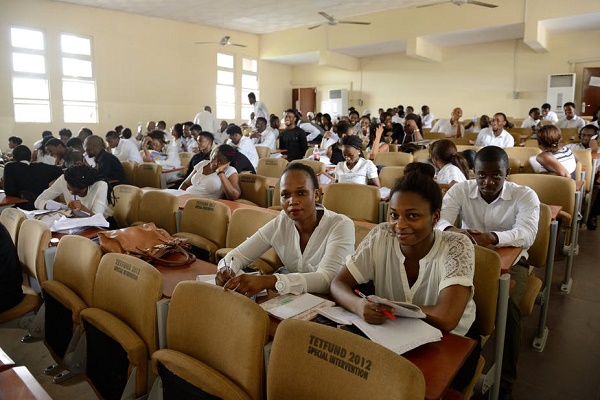PressPayNg to launch app facilitating tuition loans for tertiary institution students
On Monday, June 12, President Bola Tinubu signed the student loan bill into law in an attempt to make tertiary education more accessible to Nigerian youths. The interest-free loan scheme will be coordinated by a newly established body, the Nigerian Education Loan Fund, and aimed at students whose personal or family income comes to below ₦500,000 per annum.
Applicants looking to take advantage of the loan scheme would need to have guarantors in the form of two civil servants with a minimum of 12 years of experience or a lawyer with at least 10 years of post-call (to the bar) experience. While the student loan covers academic expenses like tuition and school materials, non-academic expenses such as student accommodation still fall on the shoulders of each student. Additionally, the loan repayment will commence two years after completion of the NYSC programme, where failure to make payments could potentially lead to a two-year jail sentence and/or a ₦500,000 fine.
At first glance, the bill appears to be in service of fostering the development of Nigerian youths through education, but at further scrutiny, it begins to look like a tokenistic gesture aimed at accumulating goodwill from the general public. With the bill aimed at improving access to education, it almost serves as an irony that the parameters for qualification are so exclusionary. Firstly, is the financial threshold required to qualify. A student from a family with two financial contributors making the minimum wage of ₦30,000 per month would not qualify for the student loan scheme which is an absurdity. In addition, the guarantors required to qualify are people the target demographic likely have no access to given their socio-economic background, placing another huge barrier to entry.
Moreover, the biggest issue with this endeavour is that it appears to be solving the wrong problem. Speaking on the bill, President Tinubu shared his rationale for signing the bill: “We all believe that education is the greatest weapon against poverty, then we have to invest in it …” This message implies that Mr President is of the opinion that universities serve as a means to empower and upskill students from low-income backgrounds and increase their earning potential, thereby lifting them out of poverty. However, with unemployment rates for BSc graduates standing at a whopping 40%, it appears that getting a university degree is not a reliable way for Nigerian youth to attain financial security.
Advertisement
This is not an attack on university institutions but rather an attempt to highlight the fact that they are failing to perform the task of endowing students with the skills to become assets to the workforce upon graduation. While the student loan scheme will be a welcome addition to the education system if effectively coordinated (which does not appear to be the case), the primary focus should be on reforming the tertiary education system to a functional level if the aim remains to improve economic viability by upskilling the youths and raising employment levels.
The federal and state universities have become a shadow of what they were at their inception. From long recurrent strikes (between 1999 and 2022, ASUU has gone on strike 16 times with a cumulative total of nearly four years) to deteriorating facilities and low staff wages, there is no shortage of factors to emphasise the poor state of our public universities. All these can be attributed to how these institutions are being managed. Currently, all 91 public universities in the country rely solely on government budgetary allocations in order to function. Judging by the fact that the majority of these universities allocate over 90% of their yearly budget to personnel costs alone, it is clear that funding is grossly insufficient. While the government is not blameless in this as they have defaulted on many agreements with ASSU, the universities need to change their reliance or they’ll keep getting worse. Many have already opted to check out by schooling abroad and data from Statista shows that private universities—which make up 46% of the universities in the country— only accounted for 6% of the entire student population in the year 2019, it is apparent that these options are inaccessible for the majority. Therefore, it is fundamental that we fix our universities.
To address this, the government needs to cut back on involvement in university administration and structure budget allocation on the basis of performance metrics. Public universities can no longer afford to charge anything or meagre amounts in tuition fees. As suggested by Waziri Adio, “Introducing tuition at a low rate, increasing it over time and capping even the peak at a rate much lower than the fees charged by private universities will be a way to go”. Additionally, budgetary distributions should be organised in a way that a given percentage is distributed equally among all universities, with the rest of the budget awarded based on the performance metrics such as student satisfaction, graduate career prospects, research quality and a range of other metrics.
Advertisement
The additional revenue from tuition fees will not only substantially reduce the reliance on government allocation but increase the agency of students in demanding value for their money in the form of quality education. On the other hand, a restructuring of the means of budget allocation will foster competition amongst the university and foster meritocracy. Additionally, it could potentially have the auspicious effect of forcing these institutions to seek to expand their sources of revenue. An alumni support programme will be one way to do this.
A reasonable argument that could be raised against the introduction of tuition fees would be that it places those who cannot afford it at a disadvantage. This is the point where a well-thought-out student loan scheme would come in clutch. The government cannot afford to (and should not) subsidise education for everyone, but for those who cannot bear the cost — a loan scheme would act as a subsidy of sorts. With a well-functioning university system that has the capacity to increase earning potential upon graduation, the loan scheme becomes a worthwhile investment. However, with the university institutions being in a sorry state, seeking out a loan to attain a university degree does not appear to be a solid financial plan.
Okafor works with SBM Intelligence.
Advertisement
Views expressed by contributors are strictly personal and not of TheCable.







